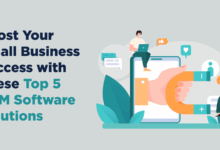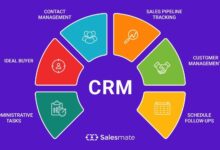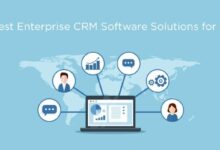AI-Powered CRM Software: A Comprehensive Guide
AI-Powered CRM Software is revolutionizing how businesses manage customer relationships. This technology leverages artificial intelligence to automate tasks, analyze data, and provide actionable insights, ultimately boosting efficiency and driving revenue growth. We’ll explore the key features, benefits, and implementation strategies of this transformative software, examining its impact across various industries and considering future trends.
From enhancing lead generation through predictive analytics to improving customer service with AI-powered chatbots, AI-powered CRM systems offer a multifaceted approach to customer relationship management. This guide delves into the specifics of these advancements, comparing different solutions and outlining the best practices for successful integration and implementation within your business.
Defining AI-Powered CRM Software
AI-powered CRM software represents a significant evolution in customer relationship management, leveraging artificial intelligence to automate tasks, analyze data, and provide insights that traditional CRM systems cannot. This allows businesses to interact with customers more effectively, personalize their experiences, and ultimately drive revenue growth.
AI-powered CRM systems go beyond the basic functionalities of traditional CRMs by incorporating advanced analytical capabilities and predictive modeling. Unlike their predecessors which primarily focused on data storage and retrieval, AI-CRMs actively process this data to identify patterns, predict customer behavior, and automate routine tasks. This leads to increased efficiency, improved customer satisfaction, and a stronger competitive advantage.
Types of AI Used in CRM Software
Several types of AI significantly enhance the capabilities of CRM software. Machine learning algorithms analyze vast datasets to identify trends and patterns in customer behavior, enabling predictive analytics for sales forecasting, churn prediction, and targeted marketing campaigns. Natural language processing (NLP) allows the system to understand and respond to customer communications in a more human-like manner, automating responses to common queries and improving the overall customer experience through chatbots and sentiment analysis. Deep learning, a subset of machine learning, can further refine these capabilities, leading to more accurate predictions and more nuanced understanding of customer interactions. Computer vision, though less commonly integrated, can also be used to analyze visual data from customer interactions, like social media posts or product images, to gain further insights.
Comparison of AI-Powered CRM Solutions
The following table compares three hypothetical AI-powered CRM solutions, highlighting their strengths and weaknesses. Note that specific features and capabilities vary widely between actual products on the market, and this table serves as a general illustration.
| CRM Solution | Strengths | Weaknesses | Pricing Model |
|---|---|---|---|
| SalesForce Einstein | Excellent predictive analytics, strong integration with other Salesforce products, robust NLP capabilities. | Can be expensive, complex to implement, requires significant technical expertise. | Subscription-based, tiered pricing |
| HubSpot with AI | User-friendly interface, strong focus on marketing automation, affordable entry-level plans. | Predictive analytics less sophisticated than some competitors, fewer advanced features. | Freemium model, with paid plans offering more features. |
| Microsoft Dynamics 365 AI | Seamless integration with Microsoft Office 365, powerful data visualization tools, strong customer support. | Steeper learning curve than some competitors, may require significant customization. | Subscription-based, tiered pricing. |
Benefits of AI in CRM
Integrating Artificial Intelligence (AI) into Customer Relationship Management (CRM) systems offers significant advantages, streamlining operations and enhancing customer interactions in profound ways. By automating tasks, providing insightful analytics, and personalizing experiences, AI-powered CRMs unlock substantial improvements across various aspects of a business.
AI Enhancement of Lead Generation and Qualification
AI significantly boosts lead generation and qualification by automating previously manual processes. AI algorithms can analyze vast amounts of data from various sources – website activity, social media interactions, and marketing campaigns – to identify potential leads that align with pre-defined customer profiles. This automated lead scoring system prioritizes high-potential leads, allowing sales teams to focus their efforts effectively. For instance, an AI-powered CRM might identify website visitors who have downloaded specific white papers or spent significant time on product pages, indicating a higher likelihood of conversion. This automated qualification saves time and resources, ultimately increasing sales conversion rates.
AI Improvement of Customer Service and Support Interactions
AI-powered chatbots and virtual assistants are transforming customer service and support interactions. These AI tools provide instant responses to common customer inquiries, freeing up human agents to handle more complex issues. AI chatbots can also learn from past interactions, improving their accuracy and efficiency over time. For example, an AI chatbot can resolve simple password reset requests or provide order tracking information, ensuring quick and effective customer service 24/7. Furthermore, AI can analyze customer sentiment within support tickets, allowing businesses to identify recurring problems and proactively address them.
AI Impact on Sales Forecasting and Revenue Optimization
AI’s predictive capabilities revolutionize sales forecasting and revenue optimization. By analyzing historical sales data, market trends, and customer behavior, AI algorithms can generate accurate sales forecasts, enabling businesses to make informed decisions about resource allocation and strategic planning. For example, an AI-powered CRM might predict a surge in demand for a particular product based on seasonal trends and social media buzz, allowing the company to proactively increase inventory and staffing levels. This proactive approach minimizes stockouts and maximizes revenue potential.
AI-Driven Personalization for Enhanced Customer Engagement
AI facilitates highly personalized customer experiences, boosting engagement and loyalty. By analyzing customer data, AI algorithms can tailor marketing messages, product recommendations, and support interactions to individual preferences. For instance, an e-commerce platform might use AI to recommend products based on a customer’s browsing history and purchase patterns. This personalized approach increases customer satisfaction and drives sales. AI-powered email marketing campaigns can also be customized to target specific customer segments with relevant content, improving open and click-through rates.
AI-Driven CRM Features
AI-powered CRM systems go beyond traditional CRM functionalities by leveraging artificial intelligence to automate tasks, analyze data, and provide insights that drive business growth. These systems offer a range of features designed to improve efficiency, increase sales, and enhance customer relationships. The core functionalities revolve around predictive analytics, automation, and personalized customer experiences.
AI-driven CRM features significantly enhance various aspects of customer relationship management. They automate repetitive tasks, freeing up human resources for more strategic initiatives. Moreover, the analytical capabilities provide actionable insights into customer behavior, preferences, and needs, leading to more effective marketing and sales strategies. Ultimately, this translates into improved customer satisfaction and increased revenue.
Core AI-Driven CRM Functionalities
The core functionalities of AI-powered CRM systems can be categorized into several key areas. These features work in concert to provide a comprehensive solution for managing customer interactions and driving business growth. Each feature offers unique benefits, contributing to a more efficient and effective CRM strategy.
Below is a list detailing the key AI-driven CRM functionalities and their associated benefits:
- Predictive Analytics: This feature uses machine learning algorithms to analyze historical data and predict future outcomes, such as customer churn, sales opportunities, and marketing campaign effectiveness.
- Benefits: Improved forecasting accuracy, proactive customer retention strategies, optimized marketing spend, identification of high-potential leads.
- Lead Scoring and Prioritization: AI algorithms analyze lead data to assign scores based on their likelihood of conversion. This allows sales teams to prioritize high-potential leads, maximizing their efficiency.
- Benefits: Increased sales conversion rates, improved sales team productivity, focused sales efforts on qualified leads, reduced wasted time on low-potential leads.
- Sales Forecasting: AI uses historical sales data, market trends, and other relevant factors to predict future sales performance. This allows businesses to make informed decisions about resource allocation and strategic planning.
- Benefits: Accurate sales projections, improved inventory management, better resource allocation, proactive identification of potential sales shortfalls.
- Automated Customer Segmentation: AI automatically groups customers based on shared characteristics, allowing for targeted marketing campaigns and personalized customer experiences.
- Benefits: Increased marketing campaign effectiveness, improved customer engagement, personalized customer interactions, enhanced customer loyalty.
- Chatbots and Virtual Assistants: AI-powered chatbots provide instant customer support, answering common questions and resolving simple issues.
- Benefits: 24/7 customer support availability, improved response times, reduced customer service costs, increased customer satisfaction.
Predictive Analytics Across Platforms
Different CRM platforms offer varying levels of sophistication in their predictive analytics capabilities. Some platforms may rely on simpler algorithms, while others utilize advanced machine learning models. The accuracy and depth of insights generated can vary significantly. For example, a platform like Salesforce Einstein offers a robust suite of AI-powered tools, including predictive lead scoring and opportunity insights, whereas a smaller, less established platform might offer more basic predictive capabilities. The choice of platform depends on the specific needs and resources of the business. Larger enterprises often benefit from more advanced platforms, while smaller businesses might find adequate support in simpler systems.
AI Enhancement of CRM Functions
| CRM Function | AI Enhancement | Specific Example | Impact |
|---|---|---|---|
| Sales | Lead scoring, sales forecasting, opportunity identification | Predictive modeling identifies high-potential leads, allowing sales reps to prioritize their efforts. | Increased sales conversion rates, improved sales productivity. |
| Marketing | Customer segmentation, personalized messaging, campaign optimization | AI-powered segmentation allows for targeted email campaigns, increasing engagement and conversion rates. | Improved marketing ROI, enhanced customer engagement. |
| Customer Service | Chatbots, automated case routing, sentiment analysis | AI-powered chatbots handle routine inquiries, freeing up human agents to focus on complex issues. | Improved customer satisfaction, reduced response times, lower support costs. |
Implementation and Integration
Implementing AI-powered CRM software presents a unique set of challenges, requiring careful planning and execution to ensure a successful integration and maximize the return on investment. A phased approach, coupled with a thorough understanding of existing systems and data, is crucial for a smooth transition.
Successful implementation hinges on addressing potential hurdles related to data migration, system compatibility, user adoption, and ongoing maintenance. The complexity increases when integrating with legacy systems or those lacking robust APIs. Moreover, the need for ongoing training and support for users is paramount to ensure the AI features are effectively utilized and the system’s full potential is realised.
Challenges in Implementing AI-Powered CRM Software
Implementing AI-powered CRM software involves several key challenges. Data quality is paramount; inaccurate or incomplete data will lead to flawed AI insights. Integration with existing systems can be complex, requiring careful planning and potentially custom development. Furthermore, ensuring data security and privacy compliance is critical, especially when dealing with sensitive customer information. Finally, successful user adoption requires comprehensive training and ongoing support to ensure staff effectively utilize the new system and its AI capabilities.
Steps Involved in Integrating AI CRM with Existing Business Systems
A structured approach to integration is essential. First, a thorough assessment of existing systems is necessary to identify compatibility issues and potential integration points. This includes analyzing data structures, APIs, and security protocols. Next, a detailed integration plan should be developed, outlining the specific steps involved, timelines, and resource allocation. The actual integration process then involves connecting the AI CRM system to the relevant databases and applications, configuring data flows, and testing the integration thoroughly. Finally, ongoing monitoring and maintenance are vital to ensure the seamless operation of the integrated system and address any emerging issues.
Best Practices for Data Migration and Ensuring Data Integrity During Integration
Data migration is a critical aspect of AI CRM implementation. Prior to migration, data cleansing and standardization are essential steps. This involves identifying and correcting inconsistencies, duplicates, and missing values in the existing CRM data. A phased approach to migration, starting with a pilot group or a subset of data, allows for early identification and resolution of any issues. Robust data validation and verification processes are vital to ensure data integrity throughout the migration process. Finally, regular data backups and a comprehensive disaster recovery plan are essential to mitigate the risk of data loss or corruption.
Examples of Successful AI-Powered CRM Implementations in Different Industries
Several industries have successfully implemented AI-powered CRM systems. In the financial services sector, AI-driven CRM has improved customer service through personalized recommendations and fraud detection. For example, a major bank used AI to analyze customer transaction data to identify potential fraudulent activities, resulting in significant cost savings and improved security. In the healthcare industry, AI-powered CRM systems have streamlined patient communication and appointment scheduling, improving operational efficiency and patient satisfaction. A large hospital network used AI to automate appointment reminders and provide personalized health recommendations to patients, leading to increased patient engagement and reduced no-show rates. In e-commerce, AI-powered CRM has enabled personalized product recommendations and targeted marketing campaigns, boosting sales conversion rates. An online retailer leveraged AI to analyze customer browsing history and purchase patterns to deliver personalized product suggestions, leading to a significant increase in sales.
Future Trends and Developments
The landscape of AI-powered CRM is constantly evolving, driven by advancements in machine learning, natural language processing, and big data analytics. These advancements are not only enhancing existing CRM functionalities but also paving the way for entirely new capabilities that will reshape how businesses interact with their customers. Understanding these emerging trends is crucial for businesses looking to leverage the full potential of AI in their CRM strategies.
The integration of more sophisticated AI capabilities will significantly impact CRM functionality. Expect to see improvements in predictive analytics, leading to more accurate forecasting of customer behavior and improved sales predictions. Enhanced personalization will become the norm, with AI tailoring customer interactions and marketing campaigns with unprecedented precision. Automation will extend beyond routine tasks, encompassing more complex processes such as lead qualification and opportunity management.
Predictive Analytics and Customer Behavior Forecasting
AI’s ability to analyze vast datasets allows for the creation of highly accurate predictive models. These models can forecast customer churn, identify high-value prospects, and predict the likelihood of a sale closing. For example, a telecommunications company could use AI to predict which customers are most likely to switch providers, allowing them to proactively offer retention incentives. This proactive approach, powered by AI, allows for more efficient resource allocation and improved customer retention rates. The accuracy of these predictions will continue to improve as AI algorithms become more sophisticated and data sets become larger and more comprehensive.
Hyper-Personalization and Enhanced Customer Experiences
The future of AI-powered CRM lies in delivering truly personalized experiences. AI can analyze customer data to understand individual preferences, needs, and pain points, enabling businesses to tailor their interactions and marketing messages accordingly. Imagine a retail company using AI to recommend products based not only on past purchases but also on browsing history, social media activity, and even real-time location data. This level of personalization fosters stronger customer relationships and drives increased sales conversion. The ability to deliver such highly personalized experiences will be a key differentiator for businesses in the coming years.
Ethical Considerations in AI-Powered CRM
The increasing reliance on AI in CRM raises important ethical considerations. Data privacy and security are paramount; robust measures must be in place to protect sensitive customer information. Bias in AI algorithms is another significant concern. If the data used to train AI models is biased, the resulting predictions and recommendations may also be biased, leading to unfair or discriminatory outcomes. Transparency is key; businesses should be clear about how they are using AI in their CRM systems and ensure that customers are aware of how their data is being used. Furthermore, the potential for AI to be used for manipulative purposes needs careful consideration and regulation.
AI-Powered CRM in Healthcare: A Future Scenario
Consider a large hospital system leveraging AI-powered CRM to manage patient interactions and improve care coordination. The system could predict patient readmissions based on historical data and clinical factors, enabling proactive interventions to prevent readmissions and improve patient outcomes. AI could also personalize treatment plans based on individual patient characteristics and preferences, optimizing treatment effectiveness and patient satisfaction. Furthermore, AI-powered chatbots could provide patients with instant access to information and support, reducing the burden on hospital staff and improving patient experience. This scenario highlights the transformative potential of AI-powered CRM in healthcare, improving both the quality of care and the efficiency of operations.
Illustrative Examples
The following examples showcase how AI-powered CRM systems can significantly enhance business operations, particularly in sales and customer engagement. These scenarios highlight the practical applications and tangible benefits of integrating AI into CRM strategies.
AI-powered CRM systems offer a wealth of opportunities to optimize various business processes. Let’s examine specific scenarios to illustrate their impact.
AI Improving Sales Conversion Rates
Consider a B2B SaaS company with a sales team struggling to convert leads effectively. Before implementing an AI-powered CRM, their conversion rate from qualified leads to closed deals was consistently around 15%. The sales team spent significant time on manual tasks like lead qualification and data entry, leaving less time for actual selling. After implementing an AI-powered CRM, the system began automatically scoring leads based on various factors like website activity, email engagement, and company size. The AI also provided predictive analytics, forecasting the likelihood of conversion for each lead. This allowed the sales team to prioritize high-potential leads and personalize their outreach. As a result, their conversion rate increased to 28% within six months. This 13% increase represents a significant improvement in sales efficiency and revenue generation. The improved lead scoring also reduced wasted time on low-potential leads, freeing up the sales team to focus on more promising opportunities.
AI-Powered Lead Nurturing Workflow
Imagine a flowchart representing the lead nurturing process. The process begins with a new lead entering the system, perhaps through a website form or marketing campaign. The AI immediately analyzes the lead’s data and assigns a score based on pre-defined criteria. High-scoring leads are automatically routed to the sales team for immediate follow-up. Lower-scoring leads enter a pre-defined nurturing sequence. This sequence might involve automated email campaigns tailored to the lead’s specific interests and industry, providing valuable content and gradually building engagement. The AI continuously monitors the lead’s activity and adjusts the nurturing sequence as needed. For example, if a lead downloads a specific whitepaper, the AI might trigger an email with related case studies. If engagement drops, the AI might suggest alternative content or a different communication approach. Finally, once a lead reaches a certain engagement threshold, the AI automatically flags them for sales follow-up, ensuring timely and effective engagement. The visual representation would clearly show the various stages, decision points, and automated actions involved in this AI-driven process.
AI-Powered Chatbot Interaction
An AI-powered chatbot on a company’s website greets a visitor with a friendly “Hello! How can I help you today?”. The visitor types, “I’m looking for information on your pricing plans.” The chatbot instantly provides links to the pricing page and a brief summary of the different plans. The visitor then asks, “What’s the difference between the Pro and Enterprise plans?” The chatbot provides a clear comparison table highlighting key features and benefits. However, when the visitor asks a complex question about integrating the software with a specific legacy system, the chatbot acknowledges its limitations and transfers the conversation to a human agent. This demonstrates the chatbot’s capabilities in handling common inquiries and providing quick access to information, while also understanding its boundaries and seamlessly escalating complex issues to a human representative. The chatbot’s limitations lie primarily in its inability to handle nuanced or highly technical questions requiring deep domain expertise or creative problem-solving. However, it excels at efficiently handling routine inquiries, freeing up human agents to focus on more complex tasks.
Final Review
AI-powered CRM software represents a significant leap forward in customer relationship management, offering businesses the tools to optimize processes, personalize interactions, and achieve substantial growth. By understanding the capabilities, benefits, and potential challenges, organizations can harness the power of AI to build stronger customer relationships and achieve a competitive edge in today’s dynamic market. The future of CRM is undeniably intelligent, and this guide provides a solid foundation for navigating this exciting evolution.





